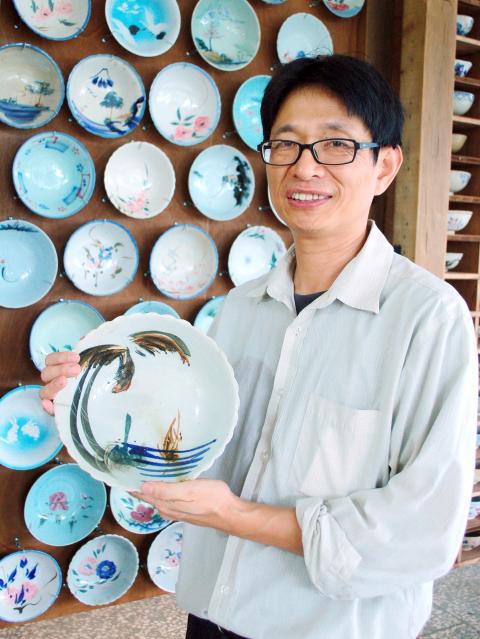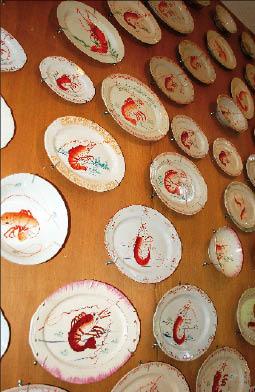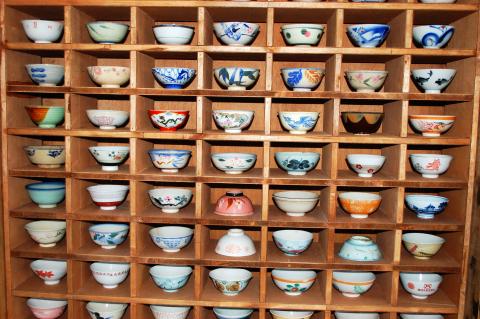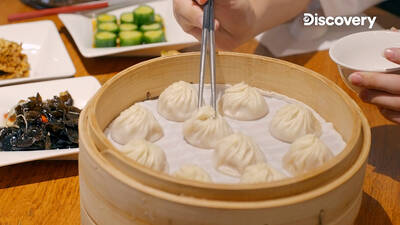The Taiwan Bowl and Dish Museum opened in Yilan County’s Yuanshan Township this past Saturday, housing an art collection of over 20,000 bowls, plates and other eating utensils. Chien Yang-tong, the museum’s founder, says that regardless of whether a person is poor or rich, bowls and plates are still used when a person eats their three daily meals. During the 30 years following World War II, it was popular to paint bowls and plates by hand, which feature a lot of local characteristics, for example, auspicious designs consisting of fish and shrimp, coconuts and the ocean, plum blossoms and orchids, bamboo and chrysanthemums, or even Fukurokuju, the god of happiness, wealth, and longevity in Japanese mythology, all representing the contemporary culture at the time they were made.
Chien says that since the 1970s, plastic eating utensils and machine-made ceramics have become common, causing people to feel a sense of nostalgia for the hand-painted eating utensils of our grandparents’ generation, back when every plate and bowl’s design was slightly different. Although the craftsmanship of ceramics at the time was far from perfect, they still give people a sense of ancient simplicity and refined familiarity, speaking volumes to the arduous enterprise craftsmen undertook to make them.
The museum is located inside Surewell’s headquarters next to Yuanshan’s Leikung Lake. It opens daily from 9am to 5pm. Tickets are NT$120, but there is a 50 percent discount for the first three months they are open, and children less than 120cm tall and disabled people can visit the museum free of admission. For more information visit the museum’s Web site at http://www.facebook.com/Taiwan.Bowl.Dish.Museum.
(Liberty Times, Translated by Kyle Jeffcoat)

Photo: Yang Yi-min, Liberty Times
照片:自由時報記者楊宜敏
蒐集二萬多件碗盤藝術品的台灣碗盤博物館,上週六在宜蘭縣員山鄉開幕,博物館創辦人簡陽同說,吃飯的碗盤,不論是市井小民或家財萬貫的富翁,每天三餐都會使用到,尤其是二次世界大戰後三十年,台灣的手工彩繪碗盤興盛,極具台灣在地特色,像是魚蝦、椰風海景,或是梅蘭竹菊、甚至日本神話中的「福祿壽」等吉祥圖案,都反映當時的社會文化。
他說,七十年代以後,塑膠餐具製品興起、機械生產的陶瓷,更讓人懷念阿公阿嬤時代手繪、每個圖案都不盡相同的碗盤,雖然當時的陶瓷作工較為粗糙,卻給人一種古樸素雅的親切感,更道盡先民篳路藍縷的辛勞。
台灣陶瓷博物館開設在員山鄉雷公埤旁的喜互惠總部內,每天開館時間為上午九時到下午五時,門票原價一百二十元,開幕前三個月五折優待,身心障礙者憑證或一百二十公分以下兒童免費入館。更多資訊可洽官方網站:http://www.facebook.com/Taiwan.Bowl.Dish.Museum。
(自由時報記者楊宜敏)

Photo: Yang Yi-min, Liberty Times
照片:自由時報記者楊宜敏

Photo: Yang Yi-min, Liberty Times
照片:自由時報記者楊宜敏

US President Donald Trump has renewed his ambition to take control of Greenland for national security reasons and questioned whether Denmark has any legal right to the Arctic island. The debate has revived scrutiny of how Greenland became part of Denmark, its current self-rule and path to independence, and Washington’s military footprint. HOW DID DENMARK GET GREENLAND? Greenland was inhabited by Inuit peoples from Asia and North America intermittently from around 2,500 BC. Around 985 AD, Vikings led by Erik the Red settled in southern Greenland, farming and building churches. Around the same time, ancestors of today’s Inuit arrived, living as hunters

A: In its latest annual travel guide, Bloomberg recommended two restaurants in Taipei: Golden Pig barbeque from South Korea and two-Michelin-star restaurant A. B: Also, tourists should definitely try Taiwanese cuisine while they’re here. Mountain & Sea House, Shin Yeh Taiwanese Cuisine, and Fujin Tree Taiwanese Cuisine & Champagne are good options. A: For local snacks, Fu Hang Soy Milk, Fu-Ba-Wang Pigs’ Knuckles Restaurant, and Wang Ji Rice Dumplings are all very popular. B: And the gold medalists of the 2025 Taipei International Beef Noodle Festival — Yun Shui Kitchen, The Howard Plaza Hotel Taipei, and Come N’ Eat

A: Bloomberg just released its annual travel guide, titled “25 Best Places to Travel in 2026.” What were the best Asian destinations? B: There were actually six Asian hotspots: Taiwan’s Taipei, Malaysia’s Penang, Kazakhstan’s Almaty, Indonesia’s Rote Island, India’s Tiger Reserves, and Oman. A: With its mix of traditional food and modern cuisine, Taipei has become a rising food capital in Asia. B: As Bloomberg reported, “Taiwan is a place that bubbles up in culinary conversation because of its famed beverage, bubble tea, and its early adoption of modern night markets.” A: And Din Tai Fung has now

Facing relentless flooding and rising expenses, Dumble Farm in England has stopped selling milk and started an unexpected but therapeutic venture: cow cuddles. In 2022, the owners sold most of their dairy cows and began letting visitors spend time brushing, petting, and even hugging specially trained Highland cows for 95 pounds per session. This unusual shift reflects the rise of the so-called healing economy, a sector where animal-assisted experiences are marketed as emotional remedies for stress and burnout. While dogs and cats remain the most common therapy animals, cows are gaining popularity for their calm nature. At Dumble Farm, only cows that